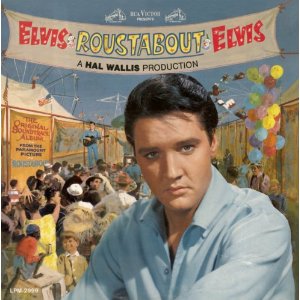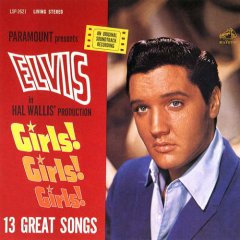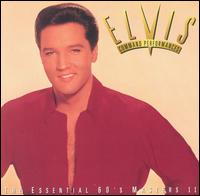
Elvis' Gold Records Volume 4 is a greatest hits album by American rock and roll singer Elvis Presley, issued by RCA Victor in mono and stereo, LPM/LSP 3921, in January 1968, with recording sessions taking place over an eight-year span at RCA Studio B in Nashville, Tennessee, and at RCA Studios and Radio Recorders in Hollywood. It is a compilation of hit singles released between 1961 and 1967, peaking at number 33 on the Billboard 200. It was certified Gold on March 27, 1992 by the Recording Industry Association of America.

Singer Presents Elvis Singing Flaming Star and Others is a compilation album by American singer and musician Elvis Presley, released by RCA Records in October, 1968. It spent five months available only at select retail stores featuring products by the Singer Sewing Machine Company as a promotional tie-in with Presley's upcoming Christmas television special on the NBC network, which Singer had sponsored. It was reissued for normal retail channels as Elvis Sings Flaming Star in March 1969, becoming the first Elvis Presley budget album on the RCA Camden label, catalogue CAS 2304. The 1969 release peaked at number 96 on the Billboard 200 album chart. It was certified Gold on July 15, 1999, and Platinum on January 6, 2004, by the Recording Industry Association of America.
"Tomorrow Is a Long Time" is a song written and recorded by Bob Dylan. Dylan's version first appeared on the album Bob Dylan's Greatest Hits Vol. II compilation, released in 1971. It was subsequently included in the triple LP compilation, Masterpieces.

Blue Hawaii is the fourth soundtrack album by American singer Elvis Presley, released on RCA Victor Records in mono and stereo, LPM/LSP 2426, on October 20, 1961. It is the soundtrack to the 1961 film of the same name starring Presley. In the United States, the album spent 20 weeks at the number one slot and 39 weeks in the Top 10 on Billboard's Top Pop LPs chart. It was certified Gold on December 21, 1961, Platinum and 2x Platinum on March 27, 1992 and 3x Platinum on July 30, 2002 by the Recording Industry Association of America. On the US Top Pop Albums chart Blue Hawaii is second only to the soundtrack of West Side Story as the most successful album of the 1960s.

Double Trouble is the fifteenth soundtrack album by American singer and musician Elvis Presley, released by RCA Victor in mono and stereo, LPM/LSP 3787, in June 1967. It is the soundtrack to the 1967 film of the same name starring Presley. Recording sessions took place at Radio Recorders and at Metro-Goldwyn-Mayer studios in Hollywood, California, on June 28, 29, and 30, 1966. It peaked at number 47 on the Billboard 200.

Roustabout is the ninth soundtrack album by American singer and musician Elvis Presley, released on RCA Victor Records in mono and stereo, LPM/LSP 2999, in October 1964. It is the soundtrack to the 1964 film of the same name starring Presley. Recording sessions took place at Radio Recorders in Hollywood, California, on March 2 and 3, and April 29, 1964. It peaked at number one on the Billboard Top LP's chart. It was certified Gold on May 20, 1988 by the Recording Industry Association of America. The album would be Presley's final soundtrack to reach number one and his last number one album until 1973's Aloha From Hawaii: Via Satellite.

"You'll Be Gone" is a song co-written by Elvis Presley and published by Elvis Presley Music and released in 1965 on the Girl Happy soundtrack album and as a 45 single. The song was recorded in 1962 and is significant because it was co-written by Elvis Presley, with his bodyguard Red West and Charlie Hodge. The other song that Elvis Presley composed was "That's Someone You Never Forget" in 1961 with Red West, which was on the Pot Luck LP released in 1962.

Girls! Girls! Girls! is the fifth soundtrack album by American singer and musician Elvis Presley, released on RCA Victor Records in mono and stereo, LPM/LSP 2426, in November 1962. It accompanied the 1962 film of the same name starring Presley. Recording sessions took place at Radio Recorders in Hollywood on March 26, 27, and 28, 1962. It peaked at number three on the Top LP's chart. It was certified Gold on August 13, 1963 by the Recording Industry Association of America.

It Happened at the World's Fair is the sixth soundtrack album by American singer and musician Elvis Presley, released by RCA Victor in mono and stereo, LPM/LSP 2697, in April 1963. It is the soundtrack to the 1963 film of the same name starring Presley. Recording sessions took place at Radio Recorders in Hollywood on August 30 and September 22, 1962. It peaked at number four on the Billboard Top Pop Albums chart.

Kissin' Cousins is the eighth soundtrack album by American singer and musician Elvis Presley, released by RCA Victor in mono and stereo, LPM/LSP 2894, in April 1964. It is the soundtrack to the 1964 film of the same name starring Presley. Recording sessions took place at RCA Studio B in Nashville, Tennessee, on May 26 and 27, and September 29 and 30, 1963. It peaked at number six on the Billboard Top LP's chart. The album was certified Gold on March 27, 1992 by the Recording Industry Association of America.

Girl Happy is the tenth soundtrack album by American singer and musician Elvis Presley, released on RCA Victor Records in mono and stereo, LPM/LSP 3338, in March 1965 – the March 1 date is disputed. It is the soundtrack to the 1965 film of the same name starring Presley. Recording sessions took place at Radio Recorders in Hollywood, California, on June 10, 11, 12, and vocal overdubs by Presley on June 15, 1964. It peaked at number eight on the Top LP's chart. It was certified Gold on July 15, 1999 by the Recording Industry Association of America.

Frankie and Johnny is the twelfth soundtrack album by American singer and musician Elvis Presley, released on RCA Victor Records in mono and stereo, LPM/LSP 3553, on March 1, 1966. It is the soundtrack to the 1966 film of the same name starring Presley. Recording sessions took place at Radio Recorders in Hollywood, California, on May 12, 13, and 14, 1965. It peaked at number 20 on the Top LP's chart. It was certified Gold and Platinum on January 6, 2004 by the Recording Industry Association of America.

Paradise, Hawaiian Style is the thirteenth soundtrack album by American singer and musician Elvis Presley, released by RCA Victor in mono and stereo, LPM/LSP 3643, in June 1966. It is the soundtrack to the 1966 film of the same name starring Presley. Recording sessions took place at Radio Recorders in Hollywood, California, on July 26 and 27, and August 2, 1965. It peaked at number 15 on the Top LP's chart.

Clambake is the sixteenth soundtrack album by American singer and musician Elvis Presley, released by RCA Victor in mono and stereo, LPM/LSP 3893, in October 1967. It is the soundtrack to the 1967 film of the same name starring Presley. He entered RCA Studio B in Nashville, Tennessee on February 21, 1967 for Recording sessions for his twenty fifth film. Supplemental material sessions took place on September 10 and 11, 1967. It peaked at number 40 on the Billboard 200.

Speedway is the seventeenth soundtrack album by American singer and musician Elvis Presley, released by RCA Victor in mono and stereo, LPM/LSP 3989, in mid 1968. It serves as the soundtrack album for the 1968 film Speedway starring Presley. Recording sessions took place at Metro-Goldwyn-Mayer studios in Hollywood, California, on June 20 and 21, 1967. It peaked at number 82 on the Billboard 200.

Follow That Dream is an EP by American singer Elvis Presley, containing four songs from the motion picture of the same name. The EP was released by RCA Victor in May 1962.

Easy Come, Easy Go is an EP by American singer Elvis Presley, containing songs from the motion picture of the same name, released by RCA Victor in March 1967.

Tickle Me Vol. 1 and Tickle Me Vol. 2 are two extended plays by Elvis Presley, containing songs from the motion picture of the same name. They were released by RCA Victor in 1965.
"Down in the Alley" is a song released as a single by The Clovers in 1957.






























